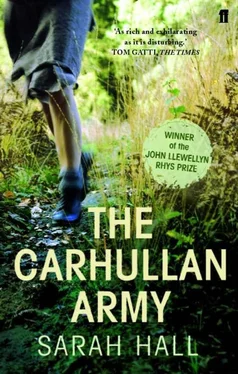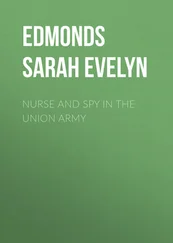Sarah Hall - The Carhullan Army
Здесь есть возможность читать онлайн «Sarah Hall - The Carhullan Army» весь текст электронной книги совершенно бесплатно (целиком полную версию без сокращений). В некоторых случаях можно слушать аудио, скачать через торрент в формате fb2 и присутствует краткое содержание. Год выпуска: 2008, Издательство: Faber and Faber, Жанр: Современная проза, на английском языке. Описание произведения, (предисловие) а так же отзывы посетителей доступны на портале библиотеки ЛибКат.
- Название:The Carhullan Army
- Автор:
- Издательство:Faber and Faber
- Жанр:
- Год:2008
- ISBN:нет данных
- Рейтинг книги:4 / 5. Голосов: 1
-
Избранное:Добавить в избранное
- Отзывы:
-
Ваша оценка:
- 80
- 1
- 2
- 3
- 4
- 5
The Carhullan Army: краткое содержание, описание и аннотация
Предлагаем к чтению аннотацию, описание, краткое содержание или предисловие (зависит от того, что написал сам автор книги «The Carhullan Army»). Если вы не нашли необходимую информацию о книге — напишите в комментариях, мы постараемся отыскать её.
The Carhullan Army — читать онлайн бесплатно полную книгу (весь текст) целиком
Ниже представлен текст книги, разбитый по страницам. Система сохранения места последней прочитанной страницы, позволяет с удобством читать онлайн бесплатно книгу «The Carhullan Army», без необходимости каждый раз заново искать на чём Вы остановились. Поставьте закладку, и сможете в любой момент перейти на страницу, на которой закончили чтение.
Интервал:
Закладка:
I remember my father fondly. He was a good man, and his eccentric defiance stuck in my mind. My mother had not lived long enough to see me aiming at the black corbies on the garden wall. I was glad my father’s bad lungs had let him escape before the next war, a decade later, that he had not witnessed the decline of his proud country. I knew it would have taken a piece out of his spine. It hit the oldest most severely. Their parents might have lived through downturns and wars, but they had only known stability, appliances, and readily available goods. For them it was simply madness to have to give up their homes, to be supplied with canned food instead of fresh global produce, and to be told that Britain was now little more than a dependent colony.
My father’s generation seemed to die out quickly, though their lives had been lived in prosperity. The health system cracked apart. Epidemics swept through the quarters in every town and city. There were new viruses too aggressive to treat. Those who did not fall ill seemed just to fade away. It was as if, one by one, they made the decision that the present and the future were intolerable propositions. And maybe they were right.
I never forgot my father’s gun. Remembering it reminded me of him, wearing his slippers and dressing gown out in the garden, bending to pull snails off his tomato plants, watching film after film on his satellite television with a cigarette drooping between his fingers. It reminded me of another era, a better time. I wondered if the rifle would be found when the house reverted to the council and was reallocated, but whenever I walked past it the garden was overrun with weeds and untended. Finally it was shut up, abandoned like all the others falling outside Rith’s habitable zone, and it became a midden.
I’d known Andrew would not be home until much later. There were shipments of kerogen coming in from the Southern ports all that week and he was overseeing their handling. I had finished my shift at the factory and I walked over the hill beside Rith to the house where I had lived as a child. The stars were beginning to spark and glint but there were few lights glimmering below, as if life in the town had been blown out. Only the Authority barracks in the castle glowed faintly, running on auxiliary generators. The grid would not go on until six, leaving people to manage as best they could with candles and the glow of Mag-lamps until then.
The garden of the old house had looked overgrown and dilapidated when I arrived. It was filled with rubbish. By the gate there were heaps of electrical appliances, chairs, and bundles of rain-swollen papers, cast-offs from homes that had been thinned down or vacated. Beside one of these piles was a rotting dog. The muzzle was sodden and decaying and its jaws looked set in a wide snarl. The eyes and fur were gone. Its belly had distended and under its tail was a writhing patch of maggots. I stood over the creature until the smell that rose from it became unbearable. Then I walked away.
The wooden potting shed at the other end of the garden was coming apart through the planking, the walls leaning inwards like an unstable structure of playing cards. It was unlocked. Heaps of cans and plastic bottles had been flung inside. I kicked them to one side and found a trowel. I brought it out and began to cut through the undergrowth at the edge of what had been our vegetable patch, pulling up the sods with my hands. There were dead bulbs in the soil and the roots of drowned plants. Only the apple tree had fruited, and bruised globes lay on the ground beneath it.
The box was still there, slightly bent and discoloured by the wet earth. For the first time in weeks I felt optimistic. ‘Thank God for Osterley, Dad,’ I heard myself say. I lifted it out, banged the lid with a stone, and forced it open. I unwound the rags. The mechanism looked a little rusty, but not too bad.
I should have been afraid of the gun. I knew the risk I ran keeping it in our quarter, even for a short period, was high. It went well past civil disobedience. Reports of robbery and rape were seldom punished with more than a reprimand now; the prison system could manage only the most serious offenders. Even black market agents and dealers were not often threatened with prosecution. But nobody was permitted to have a gun. Any kind of weapon, any suggestion of militia, was considered a direct attack on the Authority and the security of the country. Opposition meetings were sometimes broken up, if there had been a tip-off, and everyone present was searched. There were beatings, but no arrests. No one was stupid enough to carry a weapon.
To be detained meant entering an unknown system. At the factory, it was rumoured that there was a holding centre in one of the industrial cities to the south, Warrington or Lancaster, where those found guilty of severe crimes were sent. It was said there were executions. But there was no way of knowing if this was true. Radio and television broadcasts in the allocation hours were censored. There was no verification of what the structure of government really looked like now, whether it was impenetrable, or whether it had vanished altogether, and in its place something else existed.
I knew all this, but I took the gun out of the box, rubbed the grease away, and put it in the soft shoulder bag I was carrying. I covered the hole with earth and looked at the patch of disrupted ground. Then, picking up two sticks, I went back to the refuse piles. I slid them under the rank body of the dog. I held my breath and lifted it up, brought it to the spot where I had been digging and lay it down. The hollow tunnel of its eye stared up at nothing. It was little more than a rotting pelt. I put the trowel back in the shed. Then I slipped home in the dusk.
The woman from the other quarter in our building was standing outside when I reached the terrace. I startled her as I came up to the door, the bag slung over my shoulder. She held a hand to her neck and apologised for crying out. In her other hand was a packet of cigarettes and a lighter. She waved them. ‘Been saving these till I needed one,’ she said. ‘Thought you were on days this week. I heard you go out this morning. Clump, clump, clump. Bang.’ I shrugged. I wanted to get inside before the grid was turned on and I would face the scrutiny of light bulbs. I hitched the bag further behind me. She seemed distressed somehow, and unaware that she was blocking the doorway. Her face in the grey atmosphere was agitated and twitching, though she was standing rigidly. ‘What are you doing out here?’ I asked her. She snorted and shook her head. ‘Nothing. What is there to do? Can’t get our tea on yet, unless we want a cold lump. Can’t find out which poor cows have won the baby lotto. I hate this time of day. It makes me crazy.’
She shook her head. ‘Sometimes I can’t believe it. Sometimes I wish they’d just dropped a bomb on us after all. Put us out of our misery. Don’t you wish that?’ She looked at me and then looked away into the alley opposite. ‘It would be OK if I couldn’t remember how things used to be. We went to Portugal every year. We used to fly.’ She laughed bitterly and then began to cough. With brisk motions she took out a cigarette and lit it.
For a minute I felt a rush of sympathy and I wanted to befriend her, confide in her, and tell her what I was planning to do, the way I had not been able to tell Andrew. We’d never talked properly since she and her family had moved in. I had heard them through the walls, the muffled conversations, voices pitching and subsiding, the bouts of morning and evening coughing, and I’d heard them together at night, he louder than she. In our shared bathroom their footprints muddied the shower tray along with ours; their hair stuck on the enamel sides and clotted the plughole.
Читать дальшеИнтервал:
Закладка:
Похожие книги на «The Carhullan Army»
Представляем Вашему вниманию похожие книги на «The Carhullan Army» списком для выбора. Мы отобрали схожую по названию и смыслу литературу в надежде предоставить читателям больше вариантов отыскать новые, интересные, ещё непрочитанные произведения.
Обсуждение, отзывы о книге «The Carhullan Army» и просто собственные мнения читателей. Оставьте ваши комментарии, напишите, что Вы думаете о произведении, его смысле или главных героях. Укажите что конкретно понравилось, а что нет, и почему Вы так считаете.












